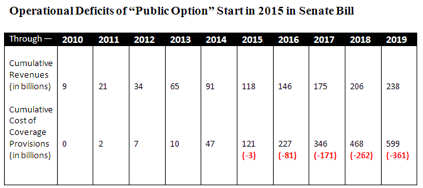The Harry Reid-Senate version of ObamaCare will start operating at massive budget-busting deficits starting in 2015, according to an Americans for Limited Government analysis of Congressional Budget Office data. By 2019, the “public option” will have spent some $361 billion more than it took in via new taxes.
So, how then does the bill earn the moniker, “deficit-neutral”? The same way the Pelosi-House version does: by rationing health care away from the nation’s elderly—cutting Medicare by some $436 billion.
But that will not pay for this new entitlement—the so-called “public option”—in the long run. Cutting Medicare has its political limits—which is a nice way of saying that cutting it too drastically is a good way for Congressmen to get thrown out on their tails.
Seniors might support entitlement reform where the federal government attempted to figure out a way to fix the broken Medicare entitlement. Under the worst-case scenario, the Medicare Board of Trustees reports that after 2012, the program will lose about $433 billion through 2019. After that, it could be broke as early as 2028.
Economists here is much that could be done to help the situation, including breaking Medicare up into smaller, privatized companies and allowing insurance competition across state lines. But that is not the case being made to the American people in the “HarryCare” bill.
Instead, Congress is attempting to expand health care spending to an additional 36 to 45 million people in an open-ended, taxpayer-financed, government-run takeover. The House version of the legislation goes even further than the Senate, proposing over $890 billion in new spending.
The fact is increasingly clear that Congressional Democrats can only hide the costs in the “public option,” which is what they have done in both versions. But between the numbers, the cover-up comes apart. It took Medicare more than 40 years to run into deficits based on revenue shortfalls. The “public option” will lose hundreds of billions within 5 to 7 years.
As the Independent Institute notes, Florida has tried a similar approach to hurricane property insurance, creating a “public option” to “compete” with private insurers. The proposal also capped how much private insurance companies could charge. This had two predictable results: private insurers fled the state, and the so-called Citizens Property Insurance Corporation “still doesn’t have sufficient reserves to weather a major hurricane. When one comes, Florida taxpayers will be on the hook for the bill.”
In other words, like “public option” health insurance, Florida’s state-run hurricane “solution” proved to be unsustainable and drove Floridians off of private insurance. In the end, it simply created an unfunded liability.
On Saturday at 8PM, the Senate legislation will face an important test vote—on whether or not to proceed to the bill. Reid now admits he is not certain he has the 60 votes necessary to continue pushing the unpopular measure. And if the majority of Americans have their way, by 9PM, the “HarryCare” will have been toe-tagged for the dead room.


